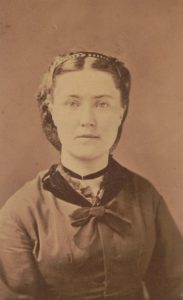
Julia Bullard Nelson
*Julia Bullard Nelson was born on this date in 1842. She was a white-American educator and activist for inclusive education and a woman's right to vote.
Born in High Ridge, Connecticut, Bullard moved to Minnesota with her family in 1857. Around 1862, she earned a teaching degree at Hamline University and then relocated to Red Wing. In 1866, she married former classmate Ole Nelson. In 1867, their infant son, Cyrus, died, and just five months later, her husband died. Newly widowed, the twenty-six-year-old teacher decided to use her classroom skills for a greater cause: educating freed blacks in the South.
1869, she traveled to Texas, where she taught Blacks through the Freedmen's Bureau. Congress created the Freedmen's Bureau to assist Blacks in adjusting to their freedom after the American Civil War and emancipation. Most Southern whites deeply resented teachers from the North. Although she was threatened with violence and shunned by some whites, Nelson taught in the South from 1870 until 1888. In the early 1880s, Nelson, a Minnesota Woman's Christian Temperance Union (WCTU) member, assumed duty as a public speaker for the group. She also worked as a superintendent for the state WCTU and was its vice president. She handled editing the group's newspaper, the Minnesota White Ribboner.
Nelson made good use of summers free from teaching duty. In 1881, she joined fourteen other women in forming the Minnesota Woman Suffrage Association (MWSA). The MWSA led the state effort to allow women to vote. As president, Nelson allied the MWSA with Ignatius Donnelly in 1893. Donnelly, a well-known Minnesota politician and famed orator, believed in a woman's right to vote. Nelson, Donnelly, and their allies persuaded the Minnesota Senate to consider a constitutional suffrage amendment. The Senate voted to drop the word "male" from the voting requirement language by thirty-two to nineteen. However, the bill did not become a law because the House, under time constraints, did not vote on it. The MWSA continued to bring their amendment before future legislatures without success.
Nelson became an excellent public speaker and one of the group's most sought-after orators. She became a paid lecturer for the National Woman Suffrage Association. As a Red Wing, Minnesota resident, she served as MWSA president from 1890 to 1896. Her busy schedule convinced Nelson to recruit twenty-one-year-old Jeremiah Patterson, a freedman and former student, to run her Belvidere farm south of Red Wing. Patterson became part of the community. He married Verna Gaylord and moved to Red Wing. In the spring of 1897, Nelson and Patterson opened the Equal Rights Meat Market. This black–white business partnership, most rare in Minnesota then, proved unsuccessful, but the Pattersons and their children continued to live in Red Wing. They stayed friends with Nelson.
By the winter of 1912, at age seventy-one, she was feeling the effects of bronchitis. In 1913, her physician suggested a long rest in Florida, and she followed his advice. But on her way south, she stopped in Washington, D.C., to attend the National Woman's Suffrage Convention. Nelson could not resist working, and in the late fall of 1914, they started a strenuous train tour of North Dakota, working for women's voting rights. Weakened by this effort, Julia B. Nelson died of pneumonia on December 24, 1914.
She was a 19th and 20th-century example of a person who advocated for, through education and intersectionality, a platform for equitable racial and gender change. A local newspaper article reported she was "The Last of the Grand Old Women of Suffrage."